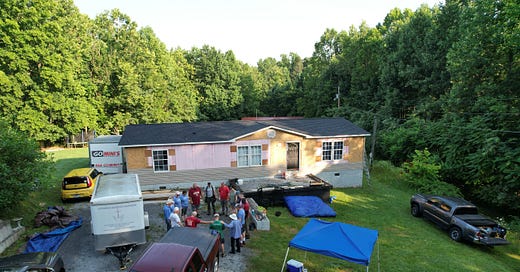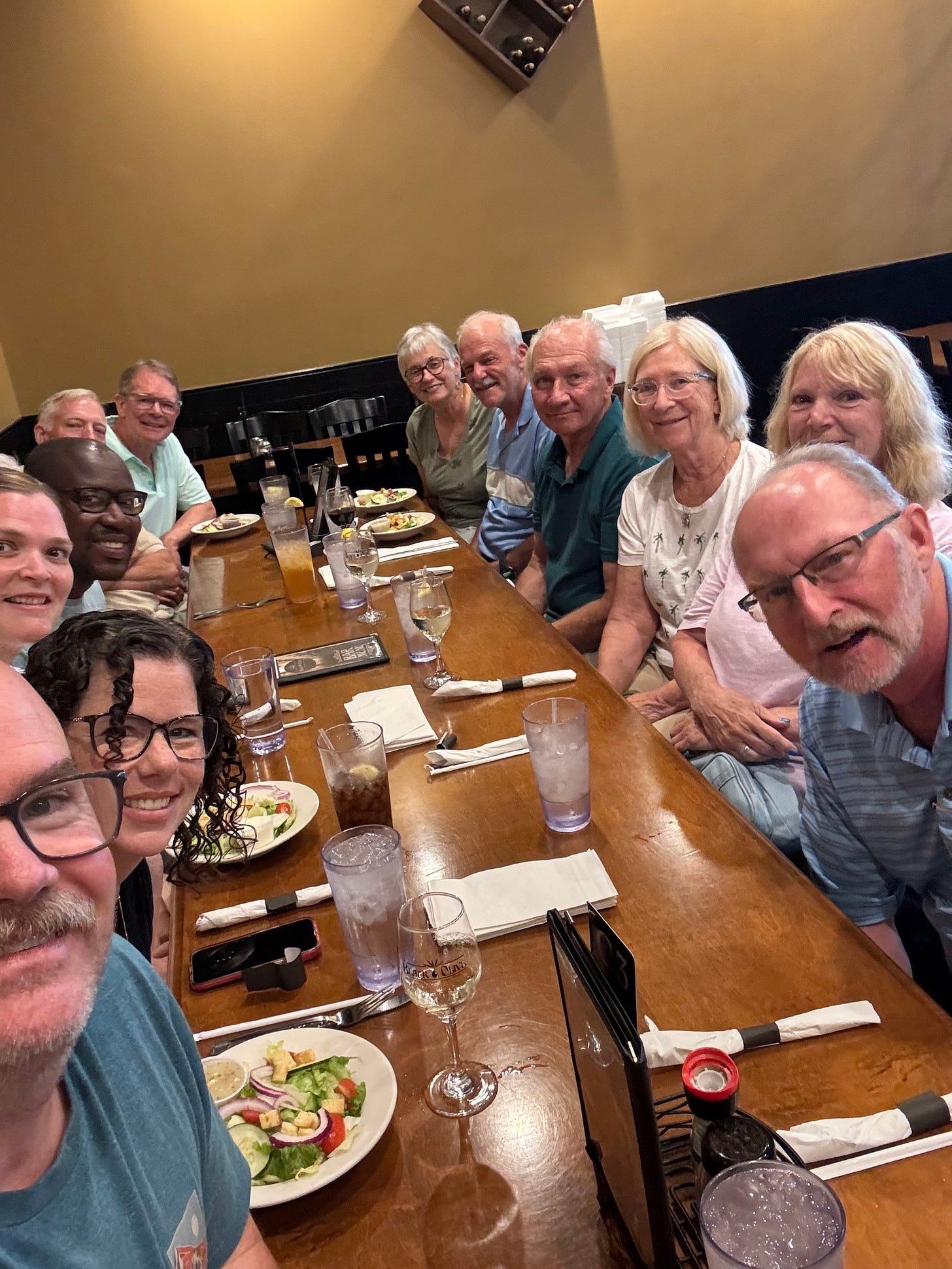Reflections On A Disaster Relief Trip
New Orleans in the Katrina era was a battleground between the forces that made it strong and those that helped destroy it. - Rebecca Solnit, A Paradise Built In Hell
Last week, I led a team of thirteen volunteers from Trinity Lutheran Church, Vemilion, OH on a disaster relief trip to Roan Mountain, Tennessee (northeast corner of the state, on the border with North Carolina). You may recall that Tennessee and North Carolina were devastated by Hurricane Helene last September. This area is unaccustomed to hurricanes as they normally weaken significantly before coming this far inland. Of course, all weather “norms” go out the window in this era of climate change.
In preparation for our trip, I read a book that caught me with a very intriguing title, A Paradise Built In Hell: The Extraordinary Communities That Arise In Disaster, Rebecca Solnit, 2009. The premise of the book, based on her research and the findings of sociologists who specialize is disaster study, is that disasters bring out the best in local communities but those efforts are often squelched by governments, organizations that wield power, and the minority of people who try to take advantage of those left vulnerable by disasters. (Her findings are based on analysis of five disasters that each make up a chapter in the book: the 1906 earthquake and fire in San Francisco, the 1917 Halifax cargo ship explosion, the 1985 Mexico City earthquake, September 11, 2001, and Hurricane Katrina.) The book affirms what my wife so astutely concluded after a few disaster relief trips to New Orleans after Hurricane Katrina, “Natural disasters bring out the best in people and the worst in people!”
Media reporting of disasters often focuses on the negative elements. (What do you remember from reporting on Katrina? Looting. People stranded on bridges or in the Superdome. FEMA’s failures.) What I have discovered through roughly 15 disaster relief trips is that there are many good people and organizations who work in relative obscurity to bring recovery to those who have suffered loss.
Disaster relief work is very rewarding and it provides an up-close and personal experience of people working cooperatively for the common good, what we might describe as MLK’s “Beloved Community.” As Rebecca Solnit notes, “New Orleans in the Katrina era was a battleground between the forces that made it strong and those that helped destroy it.” I have volunteered for disaster relief work because I want to be part of the former group, not the latter!
I want to offer a profound quote from the book and then unpack it with my experience from last week. Solnit writes:
When that (San Francisco Bay Area) earthquake shook the central California coast on October 17, 1989, I was surprised to find that the person I was angry at no longer mattered. The anger had evaporated along with everything else abstract and remote, and I was thrown into an intensely absorbing present. I was more surprised to realize that most of the people I knew and met in the Bay Area were also enjoying immensely the disaster that shut down much of the region for several days, the Bay Bridge for months, and certain unloved elevated freeways forever – if enjoyment is the right word for that sense of immersion in the moment and solidarity with others caused by the rupture in everyday life, an emotion graver than happiness but deeply positive. We don’t even have a language for this emotion, in which the wonderful comes wrapped in the terrible, joy in sorrow, courage in fear. We cannot welcome disaster, but we can value the response, both practical and psychological.
For weeks after the big earthquake of 1989, friendship and love counted for a lot, long-term plans and old anxieties for very little. Life was situated in the here and now, and many inessentials had been pared away. The earthquake was unnerving, as were the aftershocks that continued for months. Most of us were at least a little on edge, but many of us were enriched rather than impoverished, overall, at least emotionally. A more somber version of that strange pleasure in disaster emerged after September 11, 2001, when many Americans seemed stirred, moved, and motivated by the newfound sense of urgency, purpose, solidarity, and danger they had encountered. They abhorred what had happened, but they clearly relished who they briefly became.
We don’t have a word in the English language to describe the emotion of “the wonderful (that) comes wrapped in the terrible, joy in sorrow, courage in fear….the strange pleasure in disaster.” As our groups at Lutheran Church of the Resurrection, my former congregation, unpacked their disaster relief trip experiences, we often said that something seemed very wrong for us to feel like we had “a good experience” at the hands of those who had suffered so much. Rebecca Solnit puts her finger on that emotion. However, the mystical saying of Jesus - that we gain life by losing life - has been universally true in all of my disaster relief experiences. To a person, volunteers have consistently said that when they participate in disaster relief work “they get back more than they give.” That was certainly true in Roan Mountain, Tennessee last week.
We worked on the home of one family. The family was present the entire week and we had a significant amount of interaction with them. Part of disaster relief work is not only “hammering nails” but also listening to the stories of those who have been affected by the disaster; physical and psychological ministry. This family was trapped by rising water at both ends of their street. They had no electricity or WIFI for a week. During the worst of the storm, they thought the roof of their trailer was going to blow off. They were in survival mode for an entire week! The local high school, businesses, and much of the community’s infrastructure was destroyed. The homeowner shared a comment with me that was profound, a thought that I will hold onto as I reminisce about this trip. She said that in this logging community, they now have “an abundance of woodchips.” Yes, eight months after the storm, we still saw many trees downed in the mountain forests.
A prayer circle before we began our work on the house.
Our work assignment was to reside their home and replace a large sliding door that opened to their deck. The husband and wife could not have been more thankful for our assistance. They repeated their gratitude ad nauseum. It was rewarding to help them take one more step back toward normalcy.
Gratitude seemed to be the sentiment of everybody that we encountered in Roan Mountain. The family that provided cabins for us to stay in was exceedingly thankful for a financial donation that we gave them, saying that it would help to pay the mortgage this month. One of our members suffered heat exhaustion on the first day of work and had to make a trip to the emergency room. The nurse, discovering why we were there, was abundantly thankful for our assistance. It was wholly a kumbaya week; the sense of unity was palpable in the hugs, laughter, and smiles.
Always time for fellowship!
We experienced that unnamable emotion of solidarity and peace in the midst of disaster that Rebecca Solnit identifies. Politics did not matter - we were a mostly blue or purple group in a ruby red area. They said that FEMA only gave each qualifying family $700 because most of the FEMA money has gone to undocumented immigrants. I believe that FEMA only gave them $700 because the Administration has gutted FEMA and is using FEMA money to build a prison for immigrants in the Everglades. (Grrr!!!) Theology didn’t matter - we were progressive Christians in a Bible-thumping community. Culture didn’t matter - we are upper-middle class and Carter County TN is a poverty stricken county, we are northerners and they are southerners. We live on the lake and they live in the mountains. None of our differences mattered! In our nation so deeply divided, it was sheer joy to feel unity!
Rebecca and Les wrapped in a quilt created by one of our team members.
In worship this Sunday, we will read from the sixth chapter of Galatians, “Bear one another’s burdens, and in this way you will fulfill the law of Christ…. So let us not grow weary in doing what is right…. Work for the good of all.” That teaching is precisely descriptive of our efforts last week. It is a wonder and joy when our differences give way to our call to be the diverse members of the Body of Christ. Our faith becomes very real and relevant when it is faith in action; practiced faith.
The Church has spent far too much of its time arguing over morals, ethics, and the law and far too little time in loving our neighbors. As Dr. Walter Brueggemann has said, “The Church often majors in minors.” Those outside of the Church recognize that incongruity and they are turned off by it. (So am I. Perhaps, so are you?) I believe that the Bible is more a role book than it is a rule book. Our experience last week affirmed my hunch.
There are often bumps in the road when doing disaster relief work. It goes with the territory. It is a disaster, after all. We are not in control! We had our share of bumps last week. I could not be more gratified by the way that our team handled them. For a brief time, the Kingdom of God came near! Our experience reminded me of a line in one of our beloved hymns, “Oh Lord, I want to be in that number. When the saints come marching in”!
Paradise Built in Hell is an oxymoron! And one family’s “hell” was subsumed by a bit of “heaven” come down from Vermilion to Roan Mountain last week! Gospel truth!
The home, almost fully sided. We would have finished the work except that we had to stop early two days because of excessive heat and one day because of a severe thunder and lightning story. Nevertheless, much progress!








Looks like another great relief trip ... the work and experience of seeing God in the midst of disaster carries on!
I love this post with all of its gems, as well as the continuation of these deeply connective personal and spiritual experiences in these relief trips. As a member of Pastor Zorn’s former congregation in Cincinnati, it is wonderful to see that you continue to spread God’s words in works! Miss you. Mary Ann